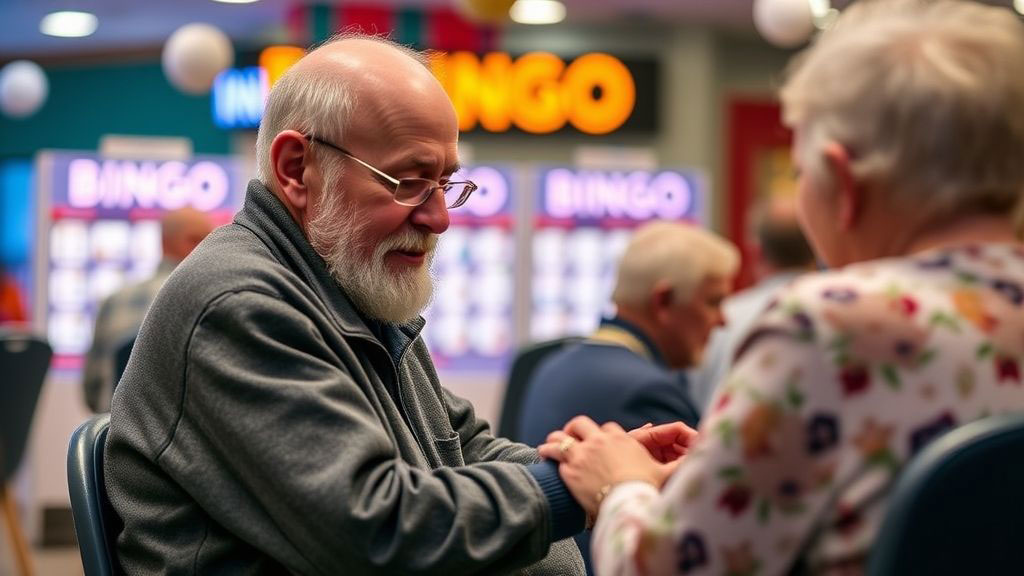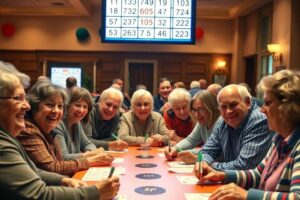There are so many people today living on their own in Britain. They feel so isolated, even in bustling cities. Extreme isolation can exhaust you. It affects mood, sleep, appetite. It can also fast-track health problems. We want big fixes, so we look for therapy, to join groups, to take courses. But there is one modest tool that still remains vastly underappreciated. Bingo. Yes — bingo.
This is nothing to do with the rules of the game or general history of bingo. This is what bingo can do for someone who feels completely out of place.
How Bingo Connects You
When you enter a bingo session — in person or on a website — you join the day, you’re momentarily coexisting. You’re not alone in your own room. You belong to a larger organization. You listen, enter the call on your card, others do the same. There is a kind of silent companionship in that.
That connection matters. In a survey of UK online bingo sites, many players reported feeling part of a “community,” made possible by chat rooms and interactions integrated in the site. The aesthetics of these sites frequently replicate what traditional halls provided: opportunities to talk, to laugh, to feel seen.
Even if there’s not a lot of talking, that feeling of people doing something at the same time kind of cushions isolation on the edge.
Mental Focus Becomes a Bridge
Bingo requires focus. You listen for numbers. You shift attention quickly. You compare, you mark. That act demands presence. If your mind is preoccupied with keeping track of that, there is less space for dark thoughts to roam.
This is not much of a mental occupation. Over time, it serves as a counterpoint to the cloud of loneliness. It reminds you: your brain functions. You can still respond. You can still join in.
Then, that kind of mental activity links you to others who are engaged in the same things. You are not alone in your head.
Low Barrier, High Impact
Bingo is known for many things, and one of its greatest strengths is that it’s so accessible. It doesn’t call for athletic prowess or costly gear or deep expertise. That’s appealing to older adults, people with mobility issues or anyone who simply wants to dip a toe in social waters.
That low barrier is crucial for people who are feeling very lonely. You don’t need to be socially confident to give it a shot. You don’t have to sign up for months of classes. Tonight you can join a session, either in a hall near by or online at a bingo website.
Bingo is easy to start, so you are more likely to play it with someone who might avoid other activities. That will extend to more women reaching out — even if it’s only that one first step.
Voice, Chat, Soft Bonds
Most of the bingo sites have chat areas, message boards, and even hosts who natter with you encouraging a bit of small talk. That soft banter is powerful. It allows you to talk or not, depending on how you feel.” It gives options.
Chat emerged as a consistent theme in the qualitative analysis of UK players. It provided a way for players to feel less alone. It provided a feeling of being heard — even if only by strangers.
Players start remembering the names of regulars in some halls. They nod and say hello, trade small talk between points. Those small bonds grow over months. The stranger at the next table is someone to nod to, a casual acquaintance. That is how connection gained slowly, gently.
Routine Restores Structure
When loneliness overtakes people, the days blur. It’s easy to become unmoored from routine without regular social anchors. Bingo is one way of trying to restore some semblance of that structure.
If you want to age your week, just bingo night the fucking thing. You tell me: On Tuesday night, we play bingo at the community hall; on Friday, online. That sets you up for little expectations, little goals. That structure offers something to anticipate. It prods you to organize, prepare, show up.
Routine also provides stability when other aspects of life are rocky. Loneliness is often characterized by mood swings. But if one rather consistently brings you together, you can stand on that.
Shared Joy in a Win
When someone calls “Bingo!”, there’s an exchange of energy. Others applaud, cheer, react. That ripple reaches you. Even if you lose, some of that lift rubs off on you.
But that uplift is not only about prizes. It’s signaling: here is something ringing positively. Is proof that joy in small measure still exists. A lot of lonely people lose faith in small good things. Bingo gives a small bit of hope that good things do still happen.
Safe Social Practice
For the deeply lonely, re-entering society can seem hazardous. Fear of rejection, judgment, awkwardness can loom large. You have bingo, which provides something of a safe haven.
Audience members generally look at their own hands in a hall, not across the table at other players. Conversations are light and optional. You can fade in or step back. Chat can be scarce or quiet on a website. You pick how much you want to participate.
That safety makes participation possible. It’s less risk than, say, showing up to a big club or class. When that is bearable, more people can attempt to rebuild those social muscles.
Case: Women in Deprived Areas
In one study in Scotland, researchers recruited women over 55 who lived in low socio-economic areas through bingo clubs. Some said they came for the social aspect — the friendships, the gossip, the opportunity to be out. They also said they felt less isolated.
And the study demonstrated that bingo clubs can double as entry points for other health or wellness campaigns, since they cater to people who might simply stay shut in if not for the lure of bingo: It was bingo that provided them with a reason to come, a way to socialize.
That indicates bingo is more than just entertainment. It can serve as a social lifeline in impoverished communities, where chances are loneliness is hardest felt.
A Word of Caution
Bingo is not a cure-all. It’s not a substitute for therapy, medical assistance or meaningful relationships. Some people may overuse it. Particularly in digital spaces, there is a tendency to become obsessed, chase wins or let the game consume one’s “real life.”
The British authors in the study of UK bingo sites warn certain features encourage excessive play. There ought to be limits. Treat bingo as one part of a greater plan to combat loneliness, rather than a silver bullet.
Also people won’t all go to a local hall or be comfortable online. Some might prefer to meet in clubs not linked with bingo. Everyone’s path is different.
Stories from Real Players
Some threads on the internet provide a hint of how bingo is helping those who are lonely. One poster on an autistic support community wrote:
“I went to play bingo … there were some quick and fun conversations … I just felt right at home. It’s a nice out-of-the-house experience that doesn’t necessarily require you to be “on” all the time.
That kind of moment — small, quiet, human — can mean a lot to anyone starved for connection.
But there is also dissent. Sensory overload and disappointment in a live hall were one person’s experience. This is the kind of thing that serves to remind us that bingo needs to suit its purpose. The lighting, sound, pace and size of the crowd in the hall — all matter. Some are going to love it, some are going to hate it. We must acknowledge both.
How to Make It Work
If you or someone you know is very, very lonely and interested in bingo, here are some kind suggestions (not tips, but things to try).
First, find a hall near you. Search for those with daytime or calmer sessions. Visit when it’s less busy. Sit for one round. Notice how you feel. Don’t pressure yourself.
The second is to give an Internet bingo site a go I can have the chat turned off (or at least limited). Use it for a short session. If chatting is overwhelming, pass on it. Soak in shared space.
Third, Choose a Consistent Schedule That Works for You. One or two sessions per week. Turn that into your “out-of-isolation” evenings.
Fourth, be selective. If one hall or site sends your anxiety through the roof, find another. The lighting too harsh? Go elsewhere. The chat too frenetic? Mute it. Know your boundaries.
Fifth, link bingo to other supports. Talk to a friend, let yourself be seen by a counselor or psychiatrist, join a local group as well. Let bingo be one column and pass the square.
The Deep Value of Shared Ritual
What bingo actually provides is ritual. It offers shared time. It provides moments when you are not quite alone, even if you don’t talk much. The sharing of that ritual is emotionally significant. It says: I fit, if only a little.
Extreme loneliness is very often the experience of feeling that you don’t fit in anywhere, or belong anymore. Bingo can poke a hole in that assumption. It says: you can join, you can be among, you can still belong in small strands.
Over weeks and months, that crack can spread. You start to feel like you can trust your social self again. You start to hope you can go more open.
Conclusion
Extreme loneliness is not uncommon in the UK. It does real harm. But they don’t need to be grand or radical. It’s often the little, persistent things that matter most.
Bingo can help. It links you with others in delicate ways. It brings mental focus. It restores routine. It offers shared moments. It provides safe space for small human connections. That won’t solve everything for many — but it will be a road back to light, a way out of the dark.
Try bingo, if you do so patiently and kindly with yourself. Let it be one part of your recovery. Let it serve as a reminder: in your time of feeling alone, you don’t have to remain so.








